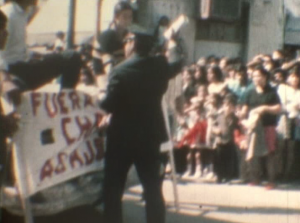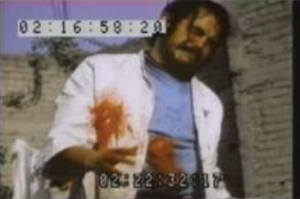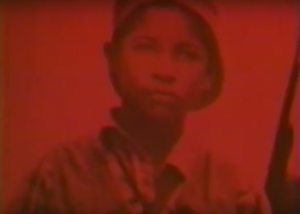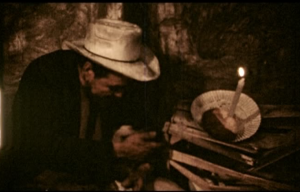
"En este cortometraje se narra la resistencia al régimen en la ciudad de Monterrey, en el estado de Nuevo León, a través de varios frentes: la irrupción de un grupo de sindicalistas independientes en el desfile oficial del 20 de noviembre, con la presencia del gobernador Luis M. Farías; la invasión de tierras y la presencia de organizaciones vecinales en Topo Chico; los muertos por un accidente laboral en la Fundidora Monterrey; las huelgas de obreros de la CTM y de panaderos de la CROC (dos poderosos sindicatos oficiales), o la actividad vecinal del Grupo 2 de Octubre en la colonia Días Ordaz" (Vázquez Mantecón, 2012).
"This short film tells the story of the resistance against the regime in Monterrey city, in the state of Nuevo León, through several perspectives: the irruption of a group of independent union laborers in the official November 20th parade, with the presence of governor Luis M. Farías; the invasion of land and the presence of neighborhood organizations in Topo Chico; the dead by a working accident in Fundidora Monterrey [Monterrey Foundry]; the strikes of CTM workers and CROC bakers (two powerful official labor unions), or the activities of neighbors of the October 2 Group in Diaz Ordaz vicinity" (Vázquez Mantecón, 2012).

"El paletero cuenta la historia de un vendedor de helados y paletas (Héctor Suárez) que recorre las calles de la ciudad. Es simpático: juega volados con los niños, conversa amistosamente con una criada que ha salido a la calle para hacer el mandado (July Furlong). De pronto un grupo de policías judiciales, vestidos de civil, deciden acosarlo. Se acercan intimidantes a la pareja. Rompen los conos de galletas para helado. El paletero siente pánico y huye por las calles de la ciudad. Es perseguido por los judiciales. Intenta esconderse en las ruinas de una casa abandonada, donde es seguido por uno de los policías. Luchan y el paletero consigue quitarle la pistola. Amenaza al policía y reemprende la huída. Al final encuentra un nuevo escondite en una vecindad. Presa del pánico, el paletero dispara sobre sus perseguidores, hiriendo a dos. Los policías lo ejecutan, y de paso matan a un niño que jugaba en el patio de la vecindad y que había quedado situado en medio del tiroteo" (Vázquez Mantecón, 2012).
El paletero [The popsicle man] tells the story of an ice cream and popsicles seller that goes around the city streets. He is nice: he plays coin toss with children, talks kindly with a maid that has left the house to run some errands. Suddenly a group of policemen, dressed as civilians, decide to harass him. They approach the couple in an intimidating manner. They break the ice cream cones. The popsicle man feels panic and runs away through the city streets. He is chased by policemen. He tries to hide in the ruins of an abandoned house, where he is followed by one of the policemen. They fight and the popsicle man takes his gun. He threatens the policeman and starts running away again. At the end he finds a new hiding spot in a vicinity. Overcome by panic, the popsicle man shoots wounding his persecutors. The policemen execute him, and they also kill a child of the neighborhood that was caught up between the shooting" (Vázquez Mantecón, 2012).

"En Patria Libre, Sergio García documentó los primeros logros de la revolución sandinista en Nicaragua. [...] Se trataba de un documental convencional, con una voz off (leída por Felio Eliel) sobre un momento de frescura y esperanza por el triunfo del Frente Sandinista de Liberación Nacional. El arranque del documental con una serie de imágenes de Sandino en alto contraste que culminan en la foto de un adolescente guerrillero (mientras que en la banda sonora se escucha a Pablo Milanés cantar "Los caminos") preludian el tono que se desarrollará sobre el caso de la revolución sandinista" (Vázquez Mantecón, 2012.)
"In Patria Libre [Free Country], Sergio García documented the first achievements of the Sandinista Revolution in Nicaragua. It was a conventional documentary, with an off voice (read by Felio Eliel) about a moment of freshness and hope because of the triumph of the Sandinista National Liberation Front. The documentary begins with a series of highly contrasted images of Sandino that end with the picture of a guerrilla teenager (while the soundtrack plays "Los caminos" [The roads] by Pablo Milanés), which is a prelude to the tone that will be used to describe the Sandinista Revolution" (Vázquez Mantecón, 2012).
"There Was a Tramp has, at first fade-in, a similarity to other tramp pictures, but the life breathed into the main character is what brings this film out of the ordinary and sets it apart from the rest. The story line becomes almost secondary to the acting of the tramp and his portrayal" PSA Journal, Aug. 1967, 36.

"Era una película muy sencilla, filmada al estilo de cine directo, que seguía los pasos y la vida de un personaje urbano singular: un hombre que acompañado de su perro recorre las calles de la ciudad, las barriadas miserables. La cinta lograba momentos de una gran intimidad al mostrar la vida de este paria solitario y marginal, como aquel en que comparte con su perro un pastel para celebrar su cumpleaños en la soledad de su cuarto" (Vázquez Mantecón, 2012)
"It was a very simple film, made in the style of direct cinema, that followed the steps and the life of a singular urban character: a man that in the company of his dog walks through the city streets, the miserable neighborhoods. The film achieved moments of great intimacy by showing the life of this lonely and marginal pariah, like the moment when he shares a cake with his dog to celebrate his birthday in the loneliness of his room" (Vázquez Mantecón, 2012)
Total Pages: 2